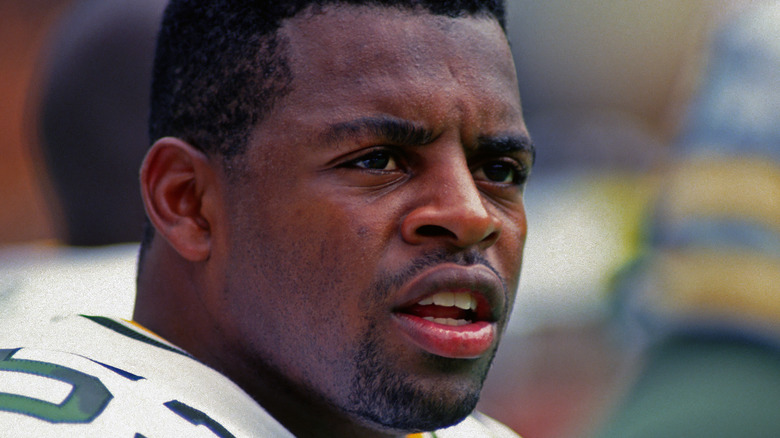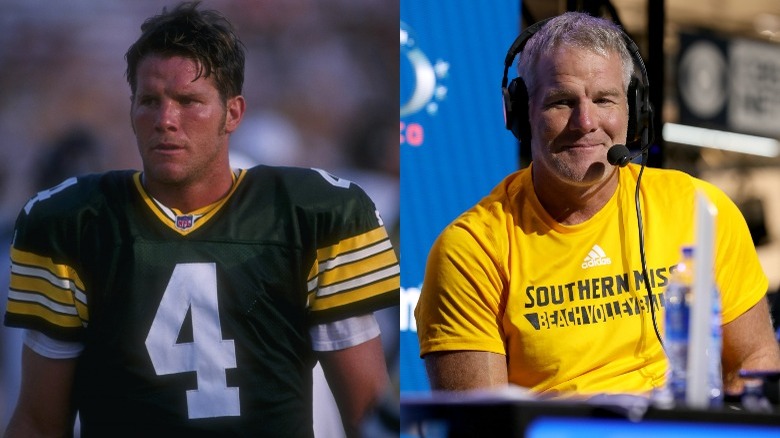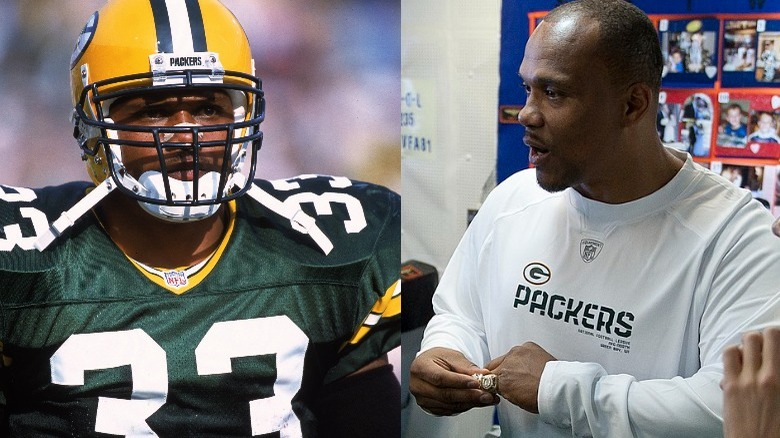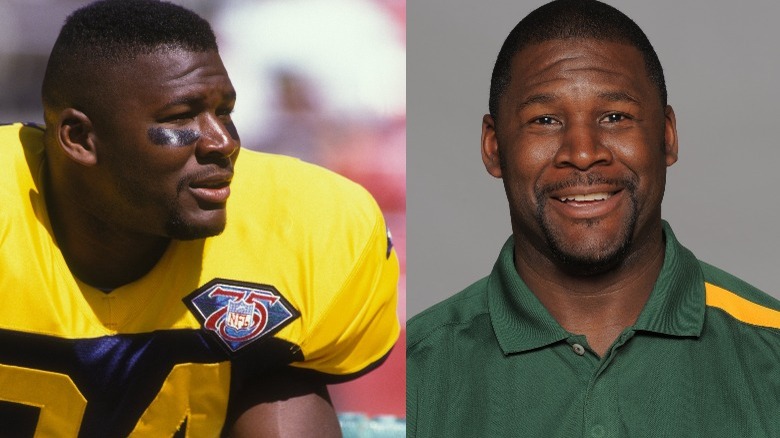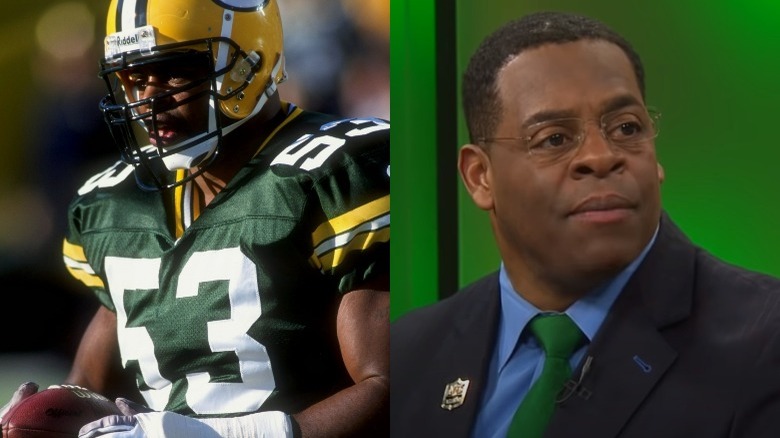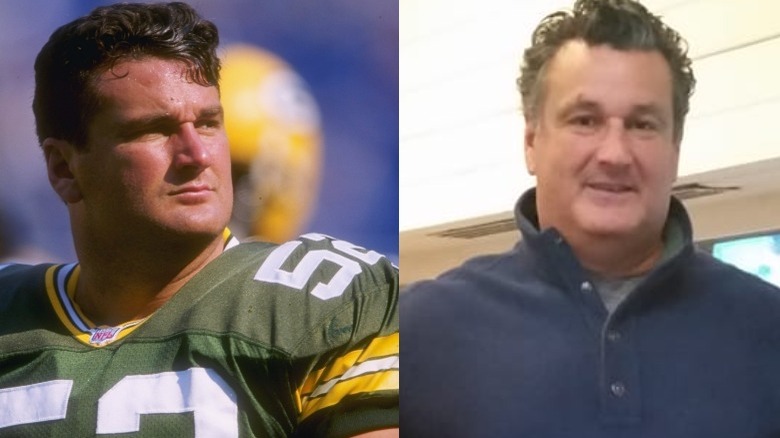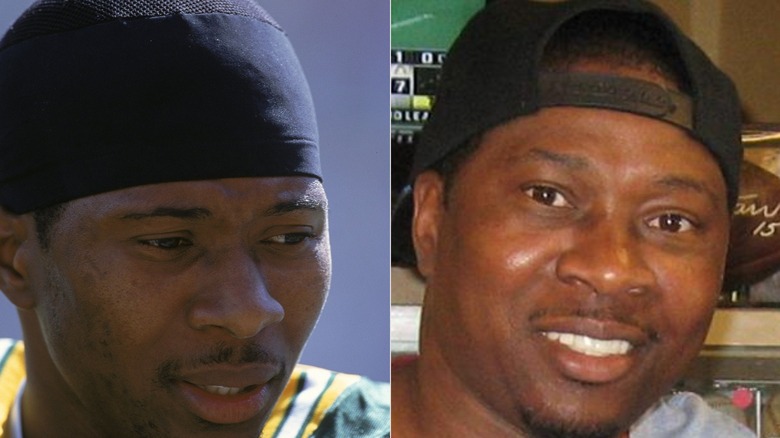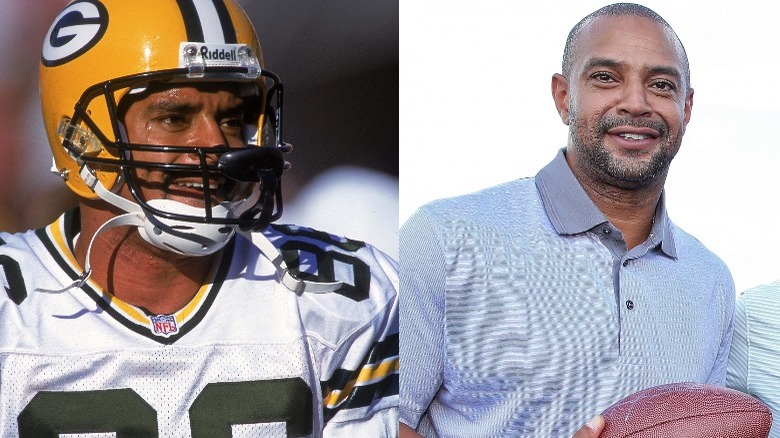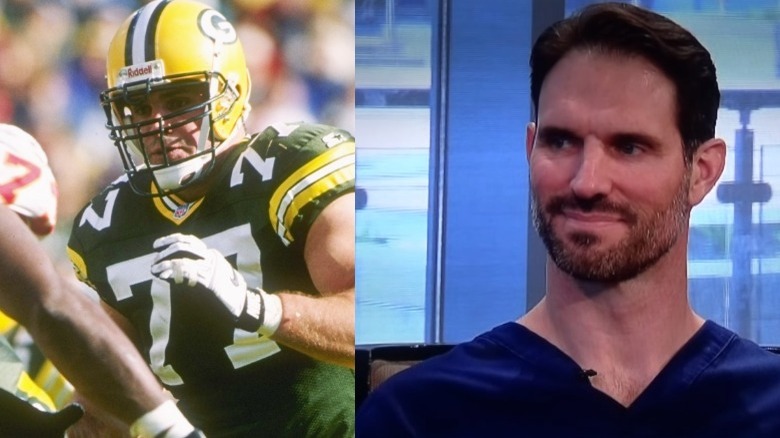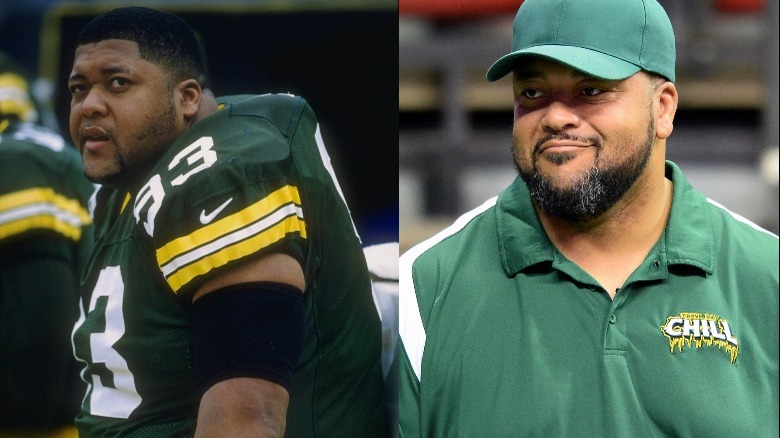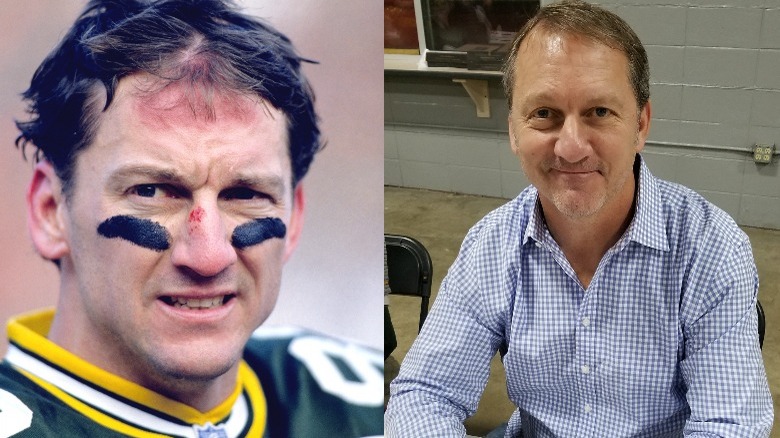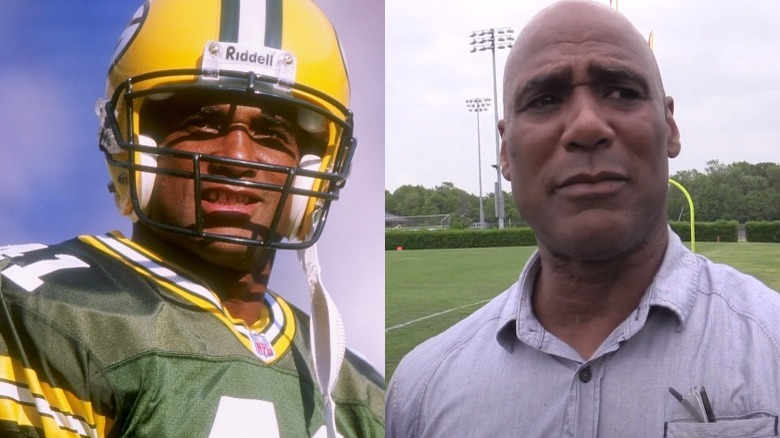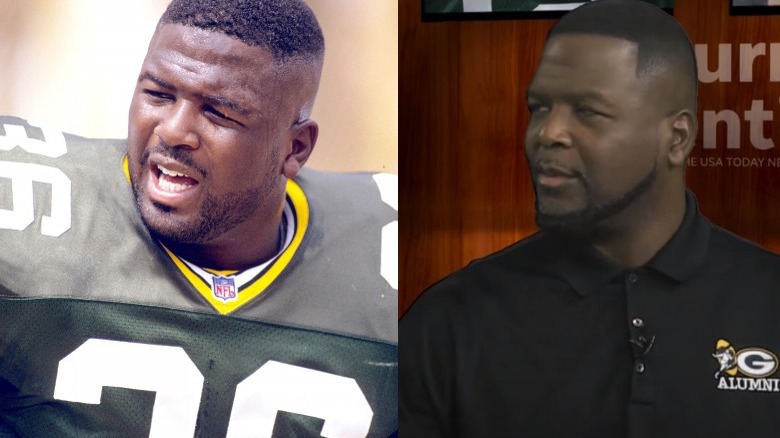What The '96 Packers Look Like Now
Hindsight, says ESPN, is 20/20. What does that have to do with the '96 Green Bay Packers? When it comes to quarterbacks, they don't come much more high-profile than Brett Favre. He's always associated with the Packers, but he wasn't originally drafted by them. He had been drafted by the Falcons in '91 and traded to the Packers in '92 — in exchange for a first-round draft pick — and given the career he went on to have, that seems like a horrible mistake. Hindsight, and all.
Favre ended up being the linchpin of the Packers, including the team that both ESPN and the NFL count among one of the greatest teams in the league's history. They'd come a long way from that day in August of 1919, when the team was first assembled with such haphazardness that there are no real records of what went on that day, or who was involved in the impromptu meeting at the Green Bay Press-Gazette. History does remember, though, that it was two days later that the paper ran the scoop that the Indian Packing Co. would be sponsoring the "Packers," and 77 years later, those Packers waltzed their way to Super Bowl victory.
Where are they today?
Brett Favre
QB Brett Favre spent 16 seasons with the Green Bay Packers, and in 2015, he told Sports Illustrated that he wished he hadn't retired.
Favre's retirement years have been full of bizarre ups and downs. In 2018, USA Volleyball interviewed him: His daughter was following in his footsteps and playing college sports at Southern Miss, but she was going the volleyball route. "Supporting her and her team is what we have done since I have retired," he told them. He was serious about it, too, and was behind the construction of a volleyball-only sports complex on the campus.
In 2020, USA Today reported that Favre had come out with unconditional support for Donald Trump, tweeting, "My Vote is for what makes this country great ... my Vote is for @RealDonaldTrump." He meant it, too — a few months earlier, The Guardian reported he had been one of the guests in Trump's mid-pandemic, 10-golf-clubs-in-29-days trip.
In May of that same year, the The New York Times reported that Mississippi was front and center in a massive scandal when it came out that funds that had been earmarked for aiding the state's poor had instead been spent on everything but — including fitness programs. Favre was one of a number of people named, and had been given $1.1 million for speaking engagements that he never kept. Fast forward to October of 2021, and the state was escalating into threatening to sue Favre to get back the money he was told he needed to repay.
William Henderson
When Fansided took a look at Packers players who were the fan favorites, fullback William Henderson was absolutely on the list. His entire 12-year career was spent with the Packers, and still, he told Fox Sports that it was 2007 when he got the tap on the shoulder and the, "It's not you, it's us," speech from higher-ups. He was fine with retiring, but his post-retirement plans didn't go as, well, planned.
Henderson had been a pre-med student at the University of North Carolina, and he had planned on going back to get more degrees, and then become a sports orthopedic surgeon. That wasn't going to happen though: "I was diagnosed as disabled, according to NFL doctors," he explained. "The collateral ligaments in my thumb was ruptured, which won't allow me to flex my thumb."
With that no longer a possibility, Henderson has since gone in a different direction, and partners with a whopping 150 Wisconsin-based charities via his own foundation, Henderson Helps. That, he told TMJ4, has a heavy focus on something he knows a lot about: bullying. Once a popular target of countless bullies, he now says, "I have to do everything I can to make these young people know they are cared about, so they're not alone." He also spent some time as an owner-operator of four sweetFrog frozen yogurt shops. After getting out of that, he opened a bread distribution company, which he told NFLPA was "to create jobs for family and friends."
Edgar Bennett
Between 1992 and 1996, Edgar Bennett accumulated 3,353 rushing yards to become one of the Packers' best running backs. His career likely would have continued had he not been sidelined with a massive injury: In the 1997 preseason, he ruptured his Achilles tendon and spent the season on the bench.
After a few years with the Bears, Bennett retired in 2000 and returned to Green Bay as the director of player development. From there, PackersWire says that he was moved over as the team's running back coach and then, in 2011, to receivers coach, where he helped lead the team to a record-breaking season in the passing game. They did so well, in fact, that he was promoted to offensive coordinator.
That lasted until 2017, and when he was given the option to go back to being a receivers coach, he passed. Instead, NBC says that he transferred to the Raiders in 2018, along with head coach Jon Gruden. Fast forward to 2022, and Bennett was slated to remain there as receivers coach alongside new head coach Josh McDaniels.
George Koonce
Linebacker George Koonce had played 128 games over nine seasons in the NFL, and when he spoke with ESPN in 2015, he said that in itself had been a dream come true. He described himself as coming from a "socially and economically deprived area of eastern North Carolina," and when he was young, all he'd wanted was a chance to go to college.
That chance turned into an NFL career and a trip to the Super Bowl, but since his retirement, his life has only gotten bigger and better. After spending some time as the Packers' director of player development, Koonce moved on to become Marian University's vice president of advancement. He told the Post Crescent that it was "all about giving individuals opportunities and a chance to live out the American dream," and credited his late father with instilling in him a drive "to never give up."
The year after he started at Marian, he headed off to spend a summer at the Harvard Institute for Educational Management, saying that he hoped to inspire other NFL players to keep striving for greatness in their post-NFL careers. It's what he continues to do: Dr. Koonce has most recently spoken to the United Nations about his work with the substance use prevention program Listen First, saying that above all, we all needed to work together, "individually and collectively, to do what we can to ensure people's dignity, safety, health, and good quality of life."
Frank Winters
Frank Winters was with the Packers for 11 seasons, ending in 2002. He was the anchor of the offensive line, and post-retirement, he continues to anchor something else: their charity.
In 2014, he spoke with NJ about the then-upcoming Super Bowl, and noted that the excitement leading up to the game was just getting bigger and bigger each year. Winters has his own heartbreaking memories of the Super Bowl: In 1997, The New York Times reported that they were getting ready to start prepping for the Super Bowl when Winters got the news that his older brother had passed away from complications stemming from pneumonia. At the time, he called the Packers his second family, and he continues to be close to them.
He also continues to show up to countless charity events every year, donating a ton of time, money, and effort to the "quite expansive" network of charities that the Packers have set up. From casting his line at the Fifth Quarter Foundation's charity fishing event (via Fox) to handing out military coins at a Parade of Honor for military veterans, organizing holiday gift duffel bags for hundreds of area veterans to participating in the Children's Wisconsin Celebrity Golf invitations, Winters is there.
Tyrone Williams
Cornerback Tyrone Williams was chosen by the Packers as a third-round draft pick out of Nebraska and went right from college graduation to the Super Bowl. It wasn't until he moved on from the Packers after seven seasons that he said, "You don't really notice it until you go to another team ... you start to appreciate the old feeling."
In 1997, the Associated Press reported that he had headed off to jail to serve six months for an incident that had happened back in 1994. He had been convicted of third-degree assault and unlawful discharge of a gun. Williams served his time, and after his retirement, he decided to do something to help others avoid the same situations he'd found himself in.
In 2014, he spoke with the Milwaukee Journal Sentinel about the allegations against Darren Sharper, which he called "one of the worst things" to happen in the NFL. He also spoke about his own company, TruPros, founded with the idea of helping players deal with balancing life in sports and outside of it, along with preparing them to deal with post-retirement. "What I try to get across is this, it's life. Understand how the world works ... The beauty of it is that I survived it all ... So I feel I have a lot of information that has to be spread." As of 2022, his LinkedIn still lists him as president of the company, but the website is no longer in service.
Antonio Freeman
Wide receiver Antonio Freeman's career was filled with some big plays — like his absolutely wild, saved-by-inches reception that led to a touchdown and a win over the 2000 Vikings. When he talked to Fox in 2014, he had nothing but good things to say about the Packers team he'd long since retired from. They were family, and like all people who care about their families, he wanted them all to be safer — so that was why he was part of a safety panel. He — and other members, including John Madden — were looking at things like preventing injuries and the long-term care of players.
Freeman was also working as a television analyst for the Ravens, but it's his charity work that he continues to be known for. In 2006, he was given the Pop Warner Humanitarian Award, in recognition of his work with organizations like Big Brothers Big Sisters and Coats for Kids. He has said, "I was very blessed to do what I did for my life ... so any time I can give back, it always warms my heart ... I just want to set a good example for my kids and let them know no matter what ... you can't be too big in life."
He was still working hard in 2021: As a part of the Tackle Hygiene with Every Catch program, the Packers raised $28,000 in donations — which Freeman helped present to charities that included the Milwaukee Homeless Veterans Initiative (via Fox).
John Michels
A first-round draft pick in 1996, John Michels — and the Packers — thought that he was going to become a regular fixture at Brett Favre's side. The plan was to have the rookie learn alongside 12-year vet Ken Ruettgers, but when Ruettgers went down with an injury, Michels said, "I was kind of thrown into the fire right off the bat."
Michels spent the whole season in and out of the game, but what's that saying about the best-laid plans? It wasn't long before he found himself dealing with a catastrophic injury, and a knee that would no longer support him, much less allow him to play football. Michels was ultimately traded to Philly in 1999 and was forced into an early retirement just a few weeks later.
Michels called his rookie year "a dream," and told Last Word on Sports that he had planned on a 15-year-long career. When that didn't happen, he didn't let it slow him down. Inspired by the doctors who helped him through his own injuries — and six knee surgeries — he went back to school, became double board certified in pain medicine and radiology, and currently works as a specialist in international pain medicine at Interventional Spine & Pain in Dallas, Texas. He described his work and goals as being focused on "conservative therapies and minimally invasive procedures to help minimize pain, maximize function, and get people back to living out their dreams."
Gilbert Brown
On Milwaukee calls Gilbert Brown an "integral" part of the Packers throughout his 10-year career. He was drafted by the Packers and retired from them, and once he left the NFL, he didn't leave Wisconsin. Since retiring, he's been almost ridiculously busy. A lot of what he does involves his own Gilbert Brown Foundation, through which he raises money for around 144 charities across the state. When asked about what he got out of the work, he responded: "The only thing I need to get out of it is a smile."
The Foundation's reach is wide: In addition to running regular football camps, Brown also raises money for charities that include youth sports groups, shelters, and other non-profits. Particularly important to him is the work that he does in his talks about bullying. He said, "I've seen people who were bullied when they were kids that have grown up and now it still affects them to this day. That's why I harp on it and try to get on them so much, because it's a devastating effect on someone's psyche."
ESPN says that Brown — who was always infamous for his weight and was listed as around 340 pounds throughout his career — shed most of that weight in his retirement. He said that he had seen other players — suddenly able to eat and drink what they wanted — face weight gain, high blood pressure, and diabetes, and he didn't want to be one of those guys.
Don Beebe
Don Beebe was already a veteran receiver when he headed to the Packers; a free agent at the time, he told Fansided that he'd let his agent know that he wanted to go where he could win a Super Bowl — and that was Green Bay.
Beebe was first a part of that infamous Buffalo Bills team that headed to the Super Bowl so many times that it seemed like they would absolutely have to win eventually ... but didn't. So, when Beebe found himself winning a Super Bowl in a green uniform instead of a blue-and-white one, he says it was bittersweet. "I felt really guilty. Why me? Why me when there were guys more deserving than me? I wished they could all be there ... I pray that one day the Bills will win a Super Bowl." Fun fact? When the '96 Packers went to the Super Bowl, only Beebe and backup QB Jim McMahon had ever played in one before.
After he retired, he founded the training facility House of Speed, which focuses on character as much as physicality. (To date, more than 100,000 athletes have gone through the program.) Then, in 2018, he joined Aurora University as their head coach. He's still there and is active with charities like Make-A-Wish, the Cystic Fibrosis Foundation, and the Fellowship of Christian Athletes.
Eugene Robinson
Sportskeeda says that throughout the 1990s, Eugene Robinson was known as one of the best safeties in the game. That's probably why he said it came as a shock when — after 11 seasons — the Seahawks traded him to the Packers. The Associated Press quoted him as saying, "It's palatable. I can take it. It may cut a little bit, but it's all right."
Robinson spent two seasons with the Packers and went to the Super Bowl with them twice. After the 1997 season, though, he headed off to the Atlanta Falcons, where he had what he described as the "worst night of my life." Talking to ESPN in 2017, the topic of his 1999 arrest for solicitation of a sex worker inevitably surfaced. When it was reported (via The Washington Post), it was a huge deal — it happened on the night before the Falcons were due to play in the Super Bowl. It also happened just after he had been honored with the Bart Starr Award, which was used to honor "athletes of high moral character." The Falcons' head coach decided not to pull Robinson from the game.
Post-retirement, Robinson has spoken freely about it to current players in hopes of dissuading them from making the same mistakes he did. In addition, he has also been a track, football, and wrestling coach for Charlotte Christian School, and says that sustains him: "The sum total of my life is not defined by one Super Bowl mistake."
LeRoy Butler
Check almost any list of defensive achievements for the Packers, and it's almost guaranteed that LeRoy Butler is going to be on there somewhere. The four-time All-Pro safety started out at cornerback, but once he switched to safety, he found his space — and made history in another epic way. He was the first one to do the famous Lambeau Leap — the celebratory jump into the arms of fans.
When ESPN caught up with in 2015, he was doing radio and TV commentary for the Packers, had written a few books — including his memoir — and was regularly traveling to schools to talk about the consequences of bullying.
It's that campaign that seems most near and dear to his heart. In 2021, ABC reported that he was using what he had learned while speaking in his Butler Vs. Bullying campaign. Butler said that he had found that kids wanted something to do — so, he was launching a new initiative to help them. His GameNight Productions is an organization designed to teach students about things like lighting, sound, and video techniques, all so they can hold their own game nights centered around their community's sports teams. He simply summed up his mission like this: "Let's get back to helping our community."
